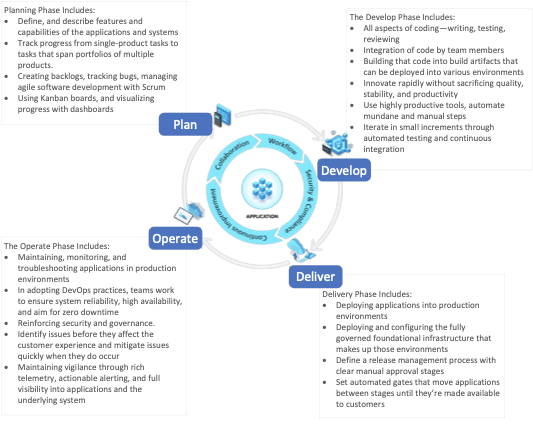Collaboration has always been a necessity for humans. So much so that scientific evidence suggests that collaboration, more than any other evolutionary factor, is why the human species is so dominant and successful.
In 2020, collaboration was a dominant theme for organizations responding to all the challenges of COVID-19. Out of necessity, people needed to change how they interact with one another and adapt to new modes of working together.
Here at CSG Pro, all of our work from BI to DevOps is about helping teams collaborate better and more efficiently.
Collaboration is essential to getting important work done. But mere collaboration does not ensure that we will accomplish our goals and objectives. Therefore, how we collaborate matters. Effective collaboration needs good tooling and enabling technologies. Ultimately, it is about value delivered.
This blog is the first in a series focused on collaboration through the lens of DevOps. This initial post lays the foundation by defining DevOps and describing key elements including DevOps culture and DevOps practices. Follow-up posts will focus on more specific opportunities, use cases, and challenges.
What is DevOps?
DevOps is the fusion of two workstreams—software development (Dev) and operations (Ops). In practice, DevOps is people, process, and technology, all functioning together to continuously produce value.
The full breadth of DevOps cannot be explained or adequately described in a single blog post and that is not the purpose of this post.
Fortunately, like most any topic these days, there is an abundance of information on DevOps readily available to anyone with the need or desire to learn more. As we get into best practices and techniques below, we linked several great resources throughout each section so you can take a deeper dive into DevOps.
What are DevOps Practices?
At CSG Pro, we are big fans of Azure DevOps. We are delighted that Microsoft has stepped up to assist organizations in embracing and adopting DevOps by providing a capable platform, along with guidance for how to take full advantage of it.
Our approach to DevOps is tightly aligned with Microsoft’s vision in this area. How organizations embrace DevOps centers around six core practices:
- Continuous Integration and Continuous Delivery (CI/CD)
- Version Control
- Agile Software Development
- Infrastructure as Code
- Configuration Management
- Continuous Monitoring
The proscribed approach to managing the lifecycle of an application is a continuous cycle of four activities: Plan, Develop, Deliver, Operate. The full details of each of these practices can be found here in the Azure DevOps documentation.

Why DevOps?
The whole point of DevOps is to enable teams to effectively collaborate and deliver more value, faster.
In practical terms, think of software development, deployment, and the ongoing operational support and management of deployed technology solutions as a value stream. Inherent in this value stream are both costs and benefits. The goal of DevOps is to reduce costs while also maximizing benefits (Value = Cost/Benefit).
DevOps also reflects the mindset of an organization. For example, the “agility” of an organization will be evident from how it does DevOps. After all, modern DevOps is a bi-product of the evolution and wide-spread adoption of Agile software methodologies.
Agile is the de-facto standard for how software and systems are developed today. The influence of Agile methods is not restricted to software development. Agile principles have been embraced more broadly to influence how organizations think and behave all up.
However, before organizations can fully adopt modern DevOps practices, organizations must first adopt a DevOps culture.
What is DevOps Culture?
DevOps culture is the adoption of new ways for people and teams to work together. It requires a true commitment to creating an environment of high-performing teams. The essential cultural elements of DevOps are…
Collaboration, Visibility, and Alignment
The goal is to increase the visibility of activities across teams (e.g. development and operations) to enable coordination and collaboration with DevOps processes from planning to deployments.
Shifts in Accountability
Expand the scope of responsibilities. All team members should willingly take ownership of results that may go beyond a narrow definition of a particular team member role.
Shorter Release Cycles
DevOps must maintain agility by releasing software in short cycles and consistently deliver value more frequently while minimizing risks and disruptions.
Shorter release cycles make planning and risk management easier since progress is incremental, which also reduces the impact on system stability. Shortening the release cycle also allows organizations to adapt and react to evolving customer needs and competitive pressure.
Continuous Learning
High-performing DevOps teams establish a growth mindset. They fail fast and incorporate learnings into their processes—continually improving, increasing customer satisfaction, and accelerating innovation and market adaptability. DevOps is a journey, so there is always room to grow.
Aiding Team Collaboration and Increasing Value
How does DevOps aid team collaboration and increase value delivered? This is an important question to answer.
Having access to all the tooling and technology aids available in Azure DevOps is an important enabler. However, tools are not enough. Knowledge and experience in using the tools is also a requirement.
Modern DevOps is important for any organization developing and deploying software solutions but there are many challenges organizations face as they work to adopt.
- How will the culture of the organization need to change to increase value delivery through DevOps?
- Where is the cost/benefit “sweet spot” for DevOps?
Organizations will need to find answers to these questions (and many more) as they implement adoption strategies. Let’s not lose sight of the underlying goal of DevOps, enabling high-performing teams to deliver more value which is the true measure of successful adoption.
In upcoming blogs, we will tackle some of the common challenges organizations must overcome with DevOps adoption along with the strategies for how to cultivate DevOps culture.
Subscribe so you never miss out on resources from the CSG Pro team. And, feel free to contact us if you have any questions or need DevOps support.




